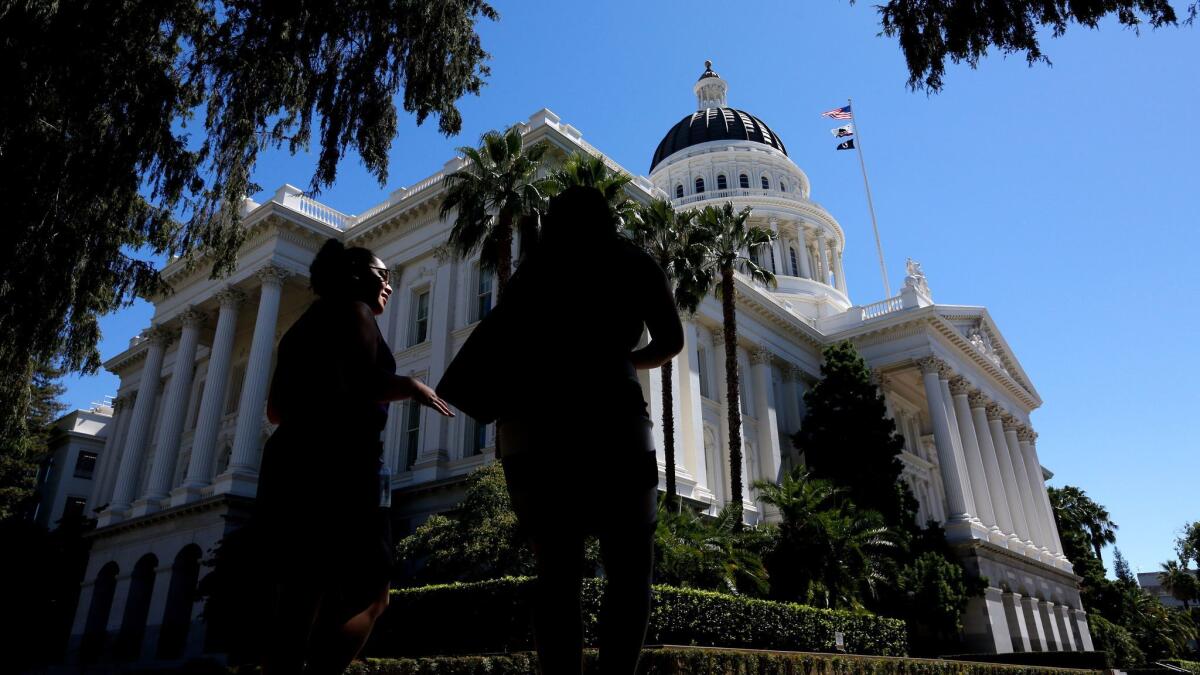Column: Political Road Map: California’s Legislature has disclosure rules unlike those that apply to anyone else

When The Times recently began looking into allegations of sexual harassment against a San Fernando Valley Democrat, reporters knew part of the answer lay behind a legal wall built by state lawmakers four decades ago.
That wall is the California Legislative Open Records Act.
Created in 1975, it sets the general rules for public review of documents written or received by the Legislature and its staff. But the description on the Assembly’s website — a law that “defines and limits” public access — gives some hint of the high bar it sets for disclosure.
Political Road Map: Lawmakers collect big campaign cash at the end of each session in Sacramento »
So high, in fact, that citizen groups and journalists often joke about its name, saying there’s hardly anything “open” about the law. Lawmakers routinely deny access to emails or calendars of who they meet with and what they’re doing. And the law makes legislators the ones to decide on disclosure.
“You are going to the guardians of these documents to get them to try to release them,” said Nikki Moore, a lobbyist and attorney for the California News Publishers Assn.
The law, Moore said, is “more deferential” to government officials than the California Public Records Act, the broad law governing access to almost all other state and local government documents. A letter written by a city manager could be disclosed in a matter of days; one written by a legislator could stay under wraps indefinitely.
At its inception, the Legislature’s records law was the focus of intense debate in the state Capitol. In February 1975, The Times quoted a Republican lawmaker who had championed a more loosely written proposal as saying that Democrats had “learned nothing from Watergate, nor do they hear the cry from the people for a more open government.” Those Democrats countered that too much transparency “would cause chaos.” In the end, the more secretive version became law.
Even in the wake of criminal wrongdoing, lawmakers have stuck to their guns about limiting access to information. When statehouse reporters requested calendars from two Democratic senators convicted on corruption charges in 2014, the Legislature blocked access. A Sacramento judge later ordered the Legislature to turn over the records, a rare victory for advocates of more transparency.
It also was a narrow victory. Moore said that unlike with other state agencies, complaints made against legislators and staff could still be hard to obtain.
Over the last two weeks, The Times’ Sacramento bureau has asked both the Assembly and the Senate for information regarding abuse complaints filed against legislators and staff members. The requests were prompted by the Oct. 17 letter from 147 women alleging systemic sexual harassment in and around the state Capitol. On Friday, one staffer came forward with a 2009 complaint she had filed against Assemblyman Raul Bocanegra (D-Pacoima) when he was a staffer.
The staffer revealed a letter from the Assembly Rules Committee that closed the investigation — the kind of document which the public has rarely seen. Whether additional documents are released in that case or related to other allegations remains to be seen.
Five separate records requests have been made by The Times, and it’s now up to the Legislature to decide whether to allow some sunlight, or whether it will continue to demand a greater right to secrecy than hundreds of other local and state government agencies.
ALSO:
Follow @johnmyers on Twitter, sign up for our daily Essential Politics newsletter and listen to the weekly California Politics Podcast
Get the L.A. Times Politics newsletter
Deeply reported insights into legislation, politics and policy from Sacramento, Washington and beyond. In your inbox three times per week.
You may occasionally receive promotional content from the Los Angeles Times.








